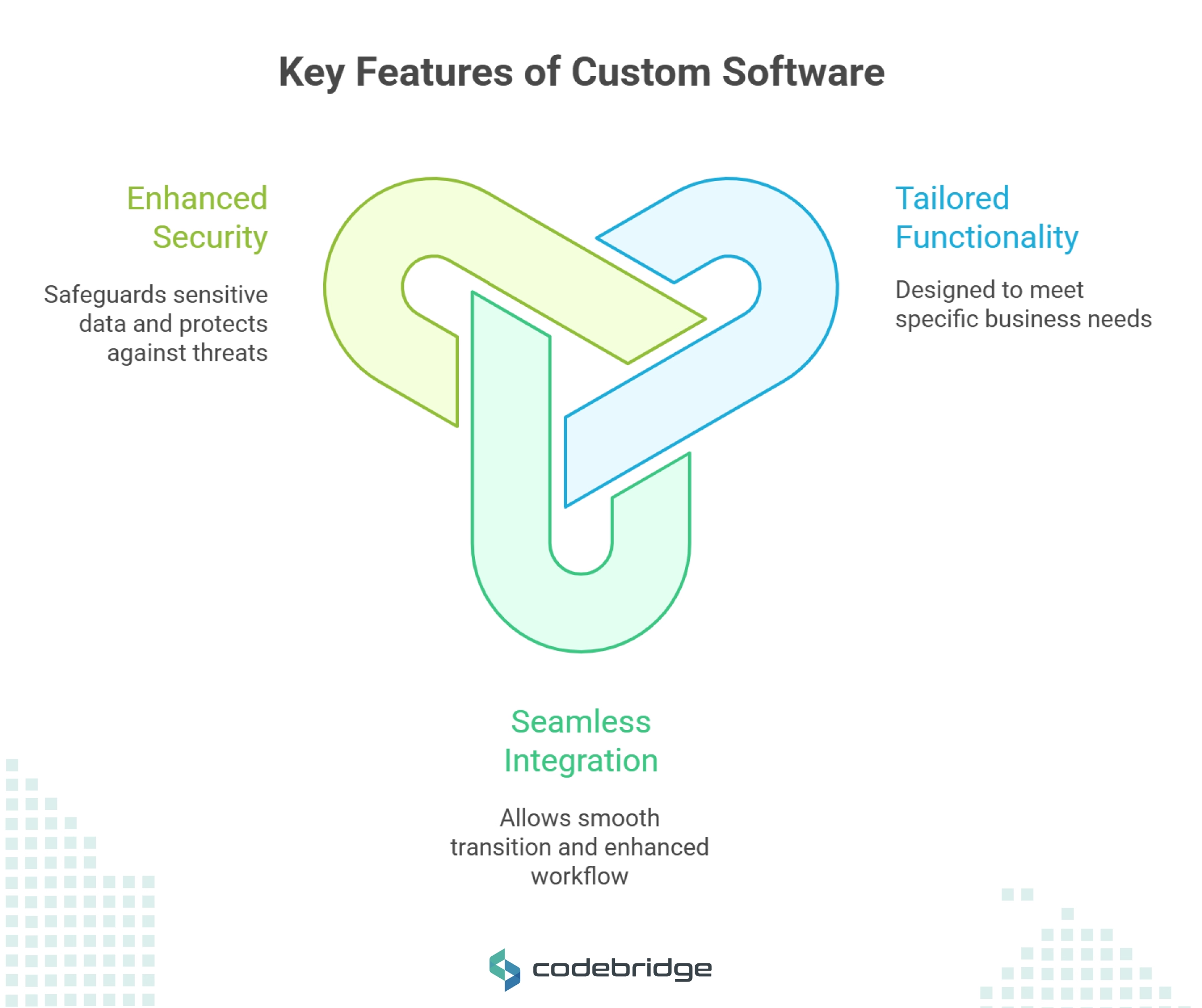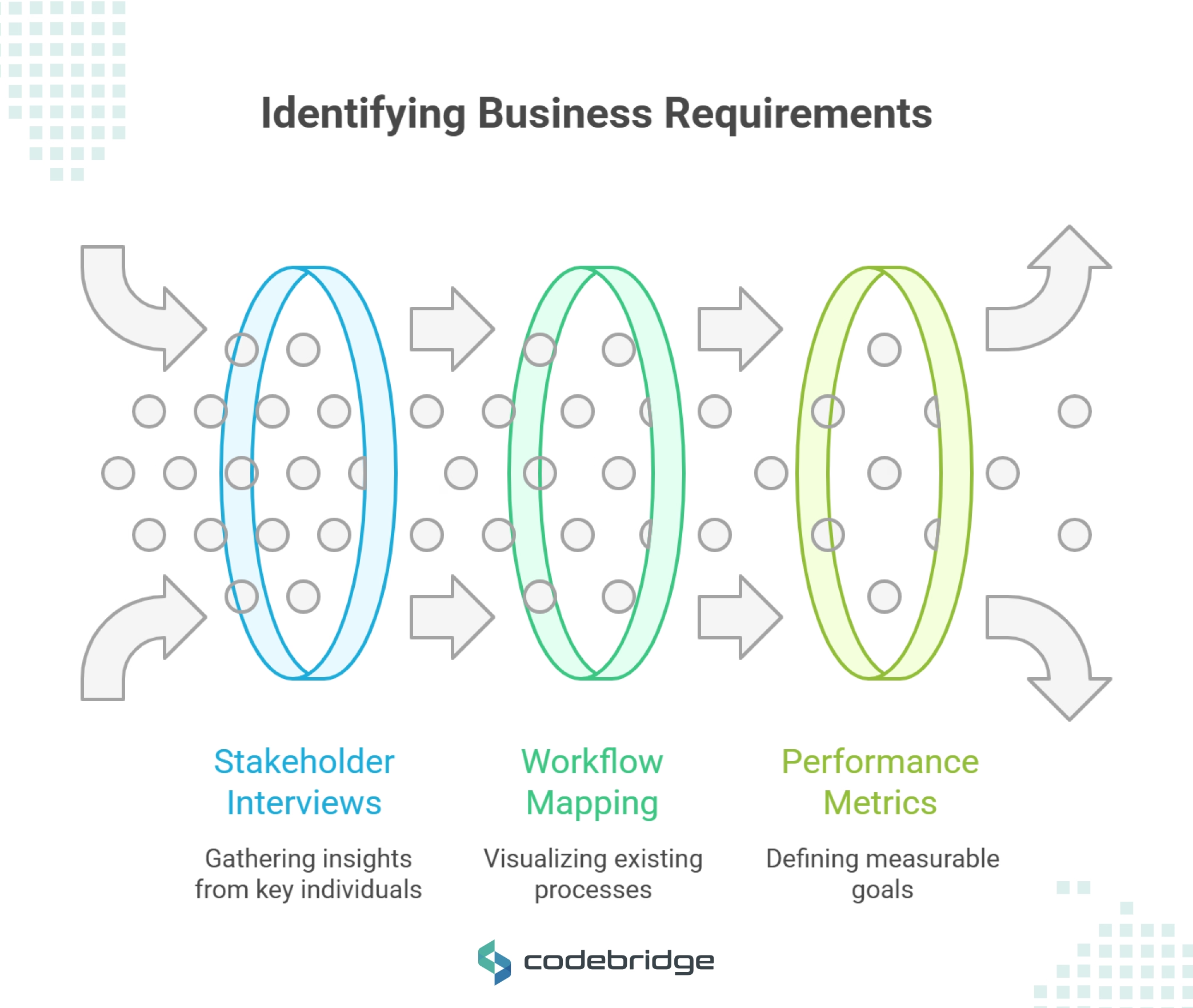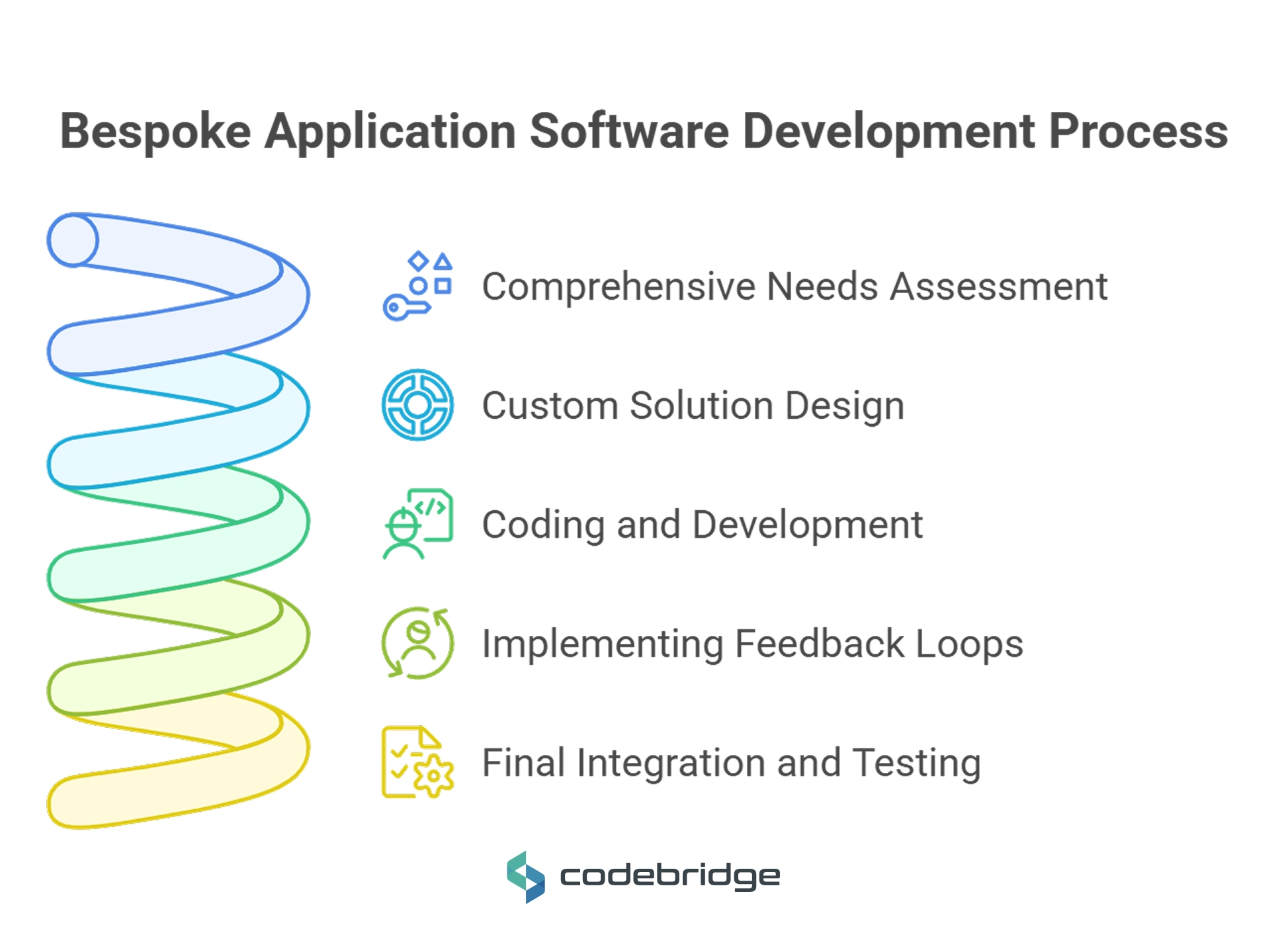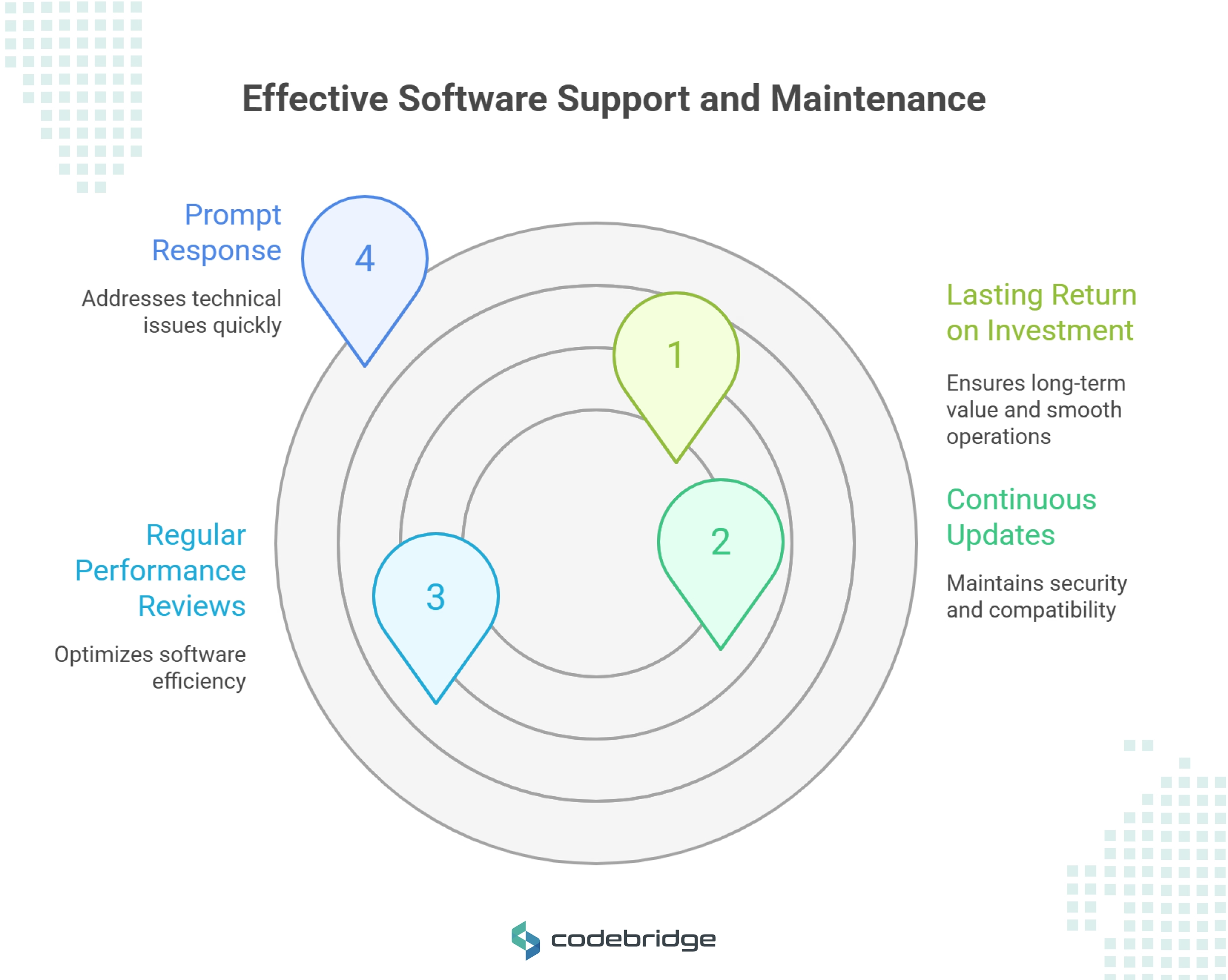Selecting a custom software development partner is less about vendor comparison and more about operational alignment. The right partner does not simply deliver features—they translate business processes into systems that are stable, adaptable, and sustainable over time. When this alignment is missing, even well-funded software initiatives can become difficult to maintain or scale.
Custom software is typically pursued when existing products no longer fit the way a business actually operates. This may involve replacing fragmented tools, supporting complex workflows, or building systems that must integrate deeply with internal infrastructure. In these scenarios, development quality, architectural decisions, and process discipline matter as much as speed or cost.
Let’s dive into why selecting the right development partner is crucial for your organization.
.avif)
Understanding Custom Software
Custom software plays a crucial role in today's business landscape. It is specifically designed for unique business needs. IT outsourcing soared to $744.6 billion in 2024 and is expected to surpass $807.9 billion in 2025, on its way to $1.2 trillion by 2030.
One key benefit is flexibility. Customizable software adapts as business evolves. It enables easy modifications and integrations.
Custom software also enhances efficiency. Tailored solutions automate tasks, saving time and resources. This leads to increased productivity.
Choosing custom software provides better data management. Businesses gain insight through reports customized to their needs. This personalized approach improves decision-making capabilities. Security is another advantage of custom software. With fewer users, it becomes a less attractive target for hackers. Custom built programs can focus on security features that meet specific requirements.
In choosing a partner, understanding their process is important. Evaluate their expertise and industry knowledge. Consider their experience with custom built software development. These aspects ensure a successful collaboration. A well-chosen partner boosts your business's competitive edge. Custom software becomes a strategic advantage.
Define custom software
Custom software is a unique solution tailored for a specific user or organization. It contrasts with off-the-shelf software designed for mass use.
Features of custom software include:
- Tailored functionality for business needs
- Seamless integration with existing systems
- Enhanced security features

Custom software provides flexibility and scalability. It adapts to your organization’s growth and changes. Such software is an investment in efficiency and strategic advantage.
Meaning of bespoke software
Bespoke software shares its meaning with custom software. It's specifically crafted to meet specific business requirements. The process emphasizes personalized solutions.
Distinct characteristics of bespoke software include:
- Crafted to meet specific organizational needs
- Developed with a user-centric approach
- Offers superior customization and flexibility
Understanding the bespoke software definition highlights its unique nature. Businesses benefit from a solution tailored specifically for them. This personalization ensures better alignment with goals.
Differences between custom and off-the-shelf software
Custom software and off-the-shelf software differ significantly. Custom solutions focus on unique requirements. Off-the-shelf options cater to general needs.
Key differences include:
- Customization: Custom solutions are highly tailored. Off-the-shelf provides basic features for many users.
- Integration: Custom software integrates seamlessly into existing processes. Off-the-shelf may not fit seamlessly without modification.
- Cost and Time: Custom solutions involve upfront investment. Off-the-shelf software offers lower immediate costs but may require future customization expenses.
Understanding these differences helps businesses make informed decisions. Choosing custom or off-the-shelf depends on specific needs and long-term strategy. Custom software is an investment in personalized, effective solutions.
About Codebridge Technology, Inc.
Codebridge Technology, Inc. is a custom software development company focused on building scalable, business-critical digital products for growing and enterprise-level organizations. We specialize in translating complex business requirements into robust software architectures that support long-term growth, performance, and security.
Our team works closely with founders, CTOs, and product leaders to design and develop custom web applications, enterprise platforms, and bespoke systems tailored to real operational needs. Rather than offering one-size-fits-all solutions, we take a consultative approach, analyzing workflows, technical constraints, and future scalability before writing a single line of code.
Evaluating Your Needs
Before embarking on a custom software project, it’s vital to evaluate your business needs. Understanding these needs ensures the software aligns with your objectives.
Start by analyzing workflows. Identify processes that need improvement or automation. This helps define custom software requirements clearly.
Consider user experience. How will the solution enhance interaction? Ensure the software prioritizes usability and intuitive design.
Security is another crucial consideration. Determine what data protection measures are necessary. This ensures safe and secure operations.
Cost is important too. Factor in both initial development and ongoing maintenance expenses. This assists in budget planning and financial forecasting.
Ultimately, clarity in your needs leads to informed decision-making. This ensures your investment in custom software is strategic and impactful.
Identifying business requirements
Identify business requirements to guide custom software development. This process involves understanding current operations and future goals.
Steps to identify requirements include:
- Conducting stakeholder interviews
- Mapping out existing workflows
- Defining specific performance metrics

These steps help in pinpointing areas where tailored software can make a difference. Accurate requirement identification allows for better alignment with business objectives.
Customizable software vs bespoke software
When evaluating solutions, consider customizable versus bespoke software. Each has distinct features suited for different needs.
Comparison highlights:
- Flexibility: Customizable software offers modifications within a framework. Bespoke software is built from scratch for specific needs.
- Cost: Customizable solutions might be initially cheaper. Bespoke software has greater potential value through exact matching of needs.
- Development Time: Customizable software typically has a shorter implementation period. Bespoke solutions require more time for development.
These distinctions are key when choosing between the two. Your choice should align with your organization’s specific processes and growth strategy.
Benefits of a tailored software solution
Investing in tailored software yields several benefits. It offers a customized approach to meet individual business needs.
Key benefits include:
- Improved efficiency through automation
- Better data insight tailored to business needs
- Enhanced security measures specific to organization risks
Tailored software aligns perfectly with your business operations. It allows modifications as your organization grows and evolves. This dynamic capability ensures sustained competitive advantage and operational efficiency.

Key Qualities to Look for in a Partner
Choosing the right partner for your custom software project is crucial. It impacts the project's success and your return on investment.
A partner with in-depth knowledge can make a significant difference. They should understand the nuances of custom software development.
Equally important is the partner’s experience in delivering customized application software. Look for a track record of successful projects in your industry.
Effective communication and collaboration are also essential. A partner who communicates clearly ensures smooth project execution. They should be proactive in addressing concerns.
Evaluating these qualities helps in selecting the best partner. It ensures your project is in capable hands, reducing potential risks.
Technical expertise in custom build software
Technical expertise is non-negotiable for a custom software partner. Their proficiency determines the project’s success and functionality.
Key aspects of technical expertise:
- Mastery of relevant programming languages
- Strong understanding of software architecture design
- Ability to integrate emerging technologies
A partner skilled in these areas delivers robust solutions. They ensure the software functions efficiently, meeting all your technical requirements.
Experience with customized application software
Experience in customized application software is a critical indicator of a partner’s capability. It shows their adaptability and problem-solving skills.
Factors to consider include:
- Past projects and successful implementations
- Industry-specific solutions they have developed
- Client testimonials and case studies
.avif)
Such experience implies the partner can tailor solutions to varied needs. It builds confidence that your project will receive innovative and effective strategies.
Strong communication and collaboration skills
A partner must exhibit strong communication and collaboration skills. This fosters a productive working relationship, crucial for project success.
Attributes of effective communication include:
- Clarity in expressing project goals and updates
- Openness to feedback and adaptive strategies
- Regular updates on project progress and challenges
Good communication ensures everyone is on the same page. It streamlines the development process and enhances teamwork, reducing the risk of misunderstandings.
The Development Process
The development process for custom software is comprehensive and structured. It involves multiple stages that ensure the final product meets all requirements.
Every stage is critical, from initial planning to final deployment. A well-documented process keeps all stakeholders aligned with the project's objectives.
Key stages in development include:
- Requirement gathering
- System design
- Development and coding
- Testing and quality assurance
- Deployment and support
These stages form the backbone of successful software projects, ensuring high quality and functional software delivery.
Understanding each stage helps set realistic expectations. It fosters better collaboration between your team and the software partner.
Steps involved in building bespoke application software
Building bespoke application software is a systematic process. Each step is tailored to meet specific client needs.
Typical steps include:
- Comprehensive needs assessment
- Developing a custom solution design
- Coding and development of the application
- Implementing client feedback loops
- Final integration and testing phases

This structured approach ensures the software aligns perfectly with your business processes. The outcome is a solution that fits like a glove.
Importance of iterative feedback
Iterative feedback is vital in custom software development. It refines the software at each development stage, aligning it with user expectations.
With regular feedback, adjustments can be made promptly. This approach prevents major redesigns later, saving time and resources.
Benefits of iterative feedback:
- Continuous improvement of the software
- Increased alignment with user needs
- Early identification of potential issues
Iterative feedback loops foster a proactive development environment. They ensure the software evolves efficiently with minimal disruptions.
Testing and quality assurance
Testing and quality assurance are crucial in the development process. They ensure the software operates smoothly and without errors.
Rigorous testing identifies bugs and inconsistencies. It validates that the software meets all specified requirements.
Key testing methods include:
- Functional testing for operational verifications
- Usability testing for user experience assessments
- Performance testing for stability checks under load
Ensuring quality reduces the risk of issues post-deployment. It guarantees that the software delivers reliable and consistent performance.

Long-term Partnership Considerations
Choosing a custom software partner isn’t just about the development process. It's also about the relationship's longevity and the post-deployment phase.
A robust long-term partnership ensures your software remains functional and relevant. Continuous improvement and support can turn this investment into a strategic asset.
Ensuring ongoing support is critical. A good software partner will provide regular updates and bug fixes to keep your system running smoothly.
Consistent maintenance prevents small issues from becoming major problems. It also protects the software against evolving security threats.
Essential long-term considerations include:
- Regular software updates and patches
- Scaling options as your business grows
- Dedicated support teams for immediate assistance
A forward-thinking approach to partnership focuses on scalability. This ensures the software can adapt to your changing business needs.
Ongoing support and maintenance for custom built programs
Support and maintenance are vital for maximizing the value of custom built programs. They ensure the software runs efficiently and evolves with your business.
These services address any emerging issues and optimize performance over time. The goal is to keep the software aligned with your organizational goals.
Key aspects of effective support include:
- Prompt response to technical issues
- Regular performance reviews and optimizations
- Continuous updates for security and compatibility

By maintaining the software proactively, you help secure a lasting return on your investment. This commitment keeps your operations running smoothly.
Updating and scaling bespoke software
As businesses grow, their software needs to scale. Bespoke software offers great flexibility for future expansion and updates.
Through strategic updates, your software can integrate new features and technologies. Scaling ensures the software continues to meet business requirements.
Considerations for updating and scaling include:
- Implementing new functionality as business needs evolve
- Adapting software for increased user loads
- Integrating with new systems or technologies
Understanding scalability and updates helps secure your software's long-term viability. This foresight enables you to plan effectively for growth.
Establishing clear communication channels
Effective communication is essential in any successful partnership. It allows for the timely exchange of ideas and feedback, ensuring project alignment.
Clear communication channels help manage expectations and reduce misunderstandings. They foster a collaborative working environment, essential for innovation.
Effective communication strategies include:
- Regular status meetings to discuss project progress
- Using collaborative tools for seamless communication
- Establishing defined points of contact for efficiency
Building a communication framework ensures all stakeholders are informed and engaged. This alignment is vital for addressing changes and challenges promptly.
Conclusion
Crafting the right custom software is a pivotal step toward achieving operational excellence and a competitive edge in today’s fast-paced business environment. By understanding the unique needs of your organization and selecting the right development partner, you can ensure that your software solutions are not only tailored to meet current demands but also scalable for future growth.
Ready to build the software your business deserves? Let’s turn your vision into a high-impact solution. Start the conversation today with Codebridge!
The significance of ongoing support and effective communication cannot be overstated, as these elements are key to maintaining the software’s relevance and functionality over time. Investing in customized software is more than just an expense; it is a strategic move that empowers your business to adapt, innovate, and thrive in an ever-evolving landscape. Ultimately, the right partnership will transform your vision into a powerful tool that propels your organization forward.
FAQ
What Is Custom Software?
Custom software is a tailored digital solution developed specifically for a single business or organization. It is designed to match unique workflows and requirements, offering functionality and flexibility that off-the-shelf software cannot provide.
What Is Bespoke Software?
Bespoke software is another term for custom software. It refers to a fully personalized solution built from the ground up to meet an organization’s exact needs, processes, and long-term goals.
How Does Custom Software Differ From Off-the-Shelf Software?
Custom software is built for your unique requirements, while off-the-shelf software provides general features for mass users. Custom solutions integrate seamlessly with your systems, offer higher security, and scale more effectively as your business grows.
What Are the Main Benefits of Custom Software?
The key benefits of custom software include improved efficiency, enhanced automation, stronger security, seamless integration, and the ability to scale as your business evolves.
How Do I Identify My Business Requirements for Custom Software?
You can identify your requirements by analyzing workflows, interviewing stakeholders, mapping pain points, and defining performance goals. Clear requirements help ensure the final software aligns with your business needs.
What Should I Look for in a Custom Software Development Partner?
Choose a partner with strong technical expertise, industry experience, proven success in custom software projects, and a clear communication process to ensure smooth collaboration.

















